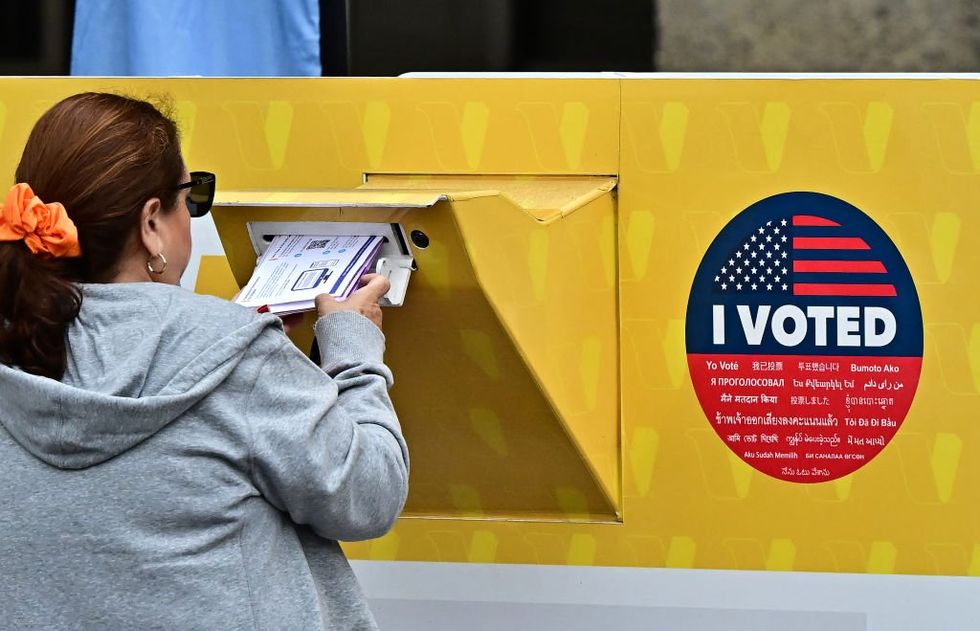Yes, mail-in voting is banned all across the world, even in Ukraine
Mail-in voting is banned in many Western countries and even in war-torn countries like Ukraine.Mail-in voting was a strong point of contention in 2020 and continues to be hot-button issue during the 2024 presidential campaign, as Democrats have embraced the voting method and conducted legal campaigns to defend it.In March, a meme circulated online purporting to list at least eight notable countries that have banned mail-in voting.A page from Snopes, a left-leaning "fact-check" website, quickly popped up and labeled the claim a "mixture" of truth and falsities.However, a review of voting laws around the world reveals that many countries do, in fact, allow absentee voting for citizens who are out of the country but disallow mail-in voting for citizens who do not have a valid absentee excuse.The alleged fact-checkers mainly leaned on absentee voting as a reason why they couldn't fully claim that mail-in voting is banned in many Western countries. As Pew Research has noted, at least 88 countries allow voting from abroad in presidential-level elections, which means that absentee voting is not a controversial topic. In fact, virtually no one in the United States challenges the right of people with a valid absentee excuse (such as overseas military service) to vote. What many have argued, however, is that those who live in the United States and are thus without an excuse for not participating in in-person voting should not be permitted to mail in their votes. And an examination of the laws in the countries in question reveals that many of them have taken exactly this position. — (@) For example, France banned mail-in voting for in-country residents due to fraud.Snopes claimed that the practice was ended in France due to a "few instances" of fraud, particularly on the island of Corsica. However, Snopes' source states that fraud and malfunctions in voting systems were not confined to Corsica and listed other instances. Additionally, the list of those who could vote by mail-in ballot in France before 1975 was needlessly excessive. It included journalists who were "on the move," travelers and representatives, commercial agents, fairground traders, seasonal agricultural workers, construction workers working on sites far from their homes, people seeking medical assistance at a "spa" or "resort," and even "young people" who were at school far from their homes.France, however, allows online voting, so long as the voter is French, resides abroad, and is properly registered.According to Newsweek, Mexico banned absentee ballots in 1991 and mandated photo ID to vote. This came after the governing Revolutionary Party was accused of fraud and intimidation in order to garner mail-in ballots. Absentee ballots were reintroduced in 2006 only for those living abroad and only for specific elections, including the presidency.This policy is mirrored in Belgium, where mail-in ballots are not allowed for residents in the country. However, those abroad can vote both by mail and by proxy. At the same time, some regions, including the Flemish region, are not yet allowed to vote by mail or online. Belgium also instituted compulsory voting, which, for better or for worse, has resulted in a near-90% turnout rate. Consistent fines without justification could lead to a 10-year removal from voting registration.Sweden has a similar system. Mail-in voting is only allowed for those abroad through mail, by courier, or through an embassy. Multiple sources make it clear that resident Swedish citizens must vote in person, with early voting up to 18 days before the election."Voters vote for a political party and may, at the same time, mark the candidate that they would prefer to be elected on their ballot paper with a cross," the European Union writes about Sweden.Italy too only allows mail-in voting for those residing abroad. Japan explains its voting process through adorable cartoons, also noting that Japanese citizens should vote in person. Certain disabilities, along with living abroad, allow for voting by mail in Japan.Snopes points out that while Ukraine and Russia do not have mail-in voting, Ukraine hasn't had an election for several years due to the implementation of martial law.While Ukraine does not allow mail-in votes, it does allow certain questionable practices, such as impermanent address changes."Citizens are able to permanently change their preferred address (which does not have to be their residence) to be assigned a more convenient polling station for both local and national elections," Snopes wrote. "For national elections, they can also ask for a temporary change of address up to five days before the vote."While paper ballots and in-person voting are continuously decried as forms of voter suppression in the United States, it does indeed seem that by international standards, the U.S. is extremely lax in allowing mail-in voting for people who are residing in the United States.Like Blaze News? Bypass the c


Mail-in voting is banned in many Western countries and even in war-torn countries like Ukraine.
Mail-in voting was a strong point of contention in 2020 and continues to be hot-button issue during the 2024 presidential campaign, as Democrats have embraced the voting method and conducted legal campaigns to defend it.
In March, a meme circulated online purporting to list at least eight notable countries that have banned mail-in voting.
A page from Snopes, a left-leaning "fact-check" website, quickly popped up and labeled the claim a "mixture" of truth and falsities.
However, a review of voting laws around the world reveals that many countries do, in fact, allow absentee voting for citizens who are out of the country but disallow mail-in voting for citizens who do not have a valid absentee excuse.
The alleged fact-checkers mainly leaned on absentee voting as a reason why they couldn't fully claim that mail-in voting is banned in many Western countries. As Pew Research has noted, at least 88 countries allow voting from abroad in presidential-level elections, which means that absentee voting is not a controversial topic. In fact, virtually no one in the United States challenges the right of people with a valid absentee excuse (such as overseas military service) to vote. What many have argued, however, is that those who live in the United States and are thus without an excuse for not participating in in-person voting should not be permitted to mail in their votes. And an examination of the laws in the countries in question reveals that many of them have taken exactly this position.
— (@)
For example, France banned mail-in voting for in-country residents due to fraud.
Snopes claimed that the practice was ended in France due to a "few instances" of fraud, particularly on the island of Corsica. However, Snopes' source states that fraud and malfunctions in voting systems were not confined to Corsica and listed other instances.
Additionally, the list of those who could vote by mail-in ballot in France before 1975 was needlessly excessive. It included journalists who were "on the move," travelers and representatives, commercial agents, fairground traders, seasonal agricultural workers, construction workers working on sites far from their homes, people seeking medical assistance at a "spa" or "resort," and even "young people" who were at school far from their homes.
France, however, allows online voting, so long as the voter is French, resides abroad, and is properly registered.
According to Newsweek, Mexico banned absentee ballots in 1991 and mandated photo ID to vote. This came after the governing Revolutionary Party was accused of fraud and intimidation in order to garner mail-in ballots. Absentee ballots were reintroduced in 2006 only for those living abroad and only for specific elections, including the presidency.
This policy is mirrored in Belgium, where mail-in ballots are not allowed for residents in the country. However, those abroad can vote both by mail and by proxy. At the same time, some regions, including the Flemish region, are not yet allowed to vote by mail or online.
Belgium also instituted compulsory voting, which, for better or for worse, has resulted in a near-90% turnout rate. Consistent fines without justification could lead to a 10-year removal from voting registration.
Sweden has a similar system. Mail-in voting is only allowed for those abroad through mail, by courier, or through an embassy. Multiple sources make it clear that resident Swedish citizens must vote in person, with early voting up to 18 days before the election.
"Voters vote for a political party and may, at the same time, mark the candidate that they would prefer to be elected on their ballot paper with a cross," the European Union writes about Sweden.
Italy too only allows mail-in voting for those residing abroad.
Japan explains its voting process through adorable cartoons, also noting that Japanese citizens should vote in person. Certain disabilities, along with living abroad, allow for voting by mail in Japan.
Snopes points out that while Ukraine and Russia do not have mail-in voting, Ukraine hasn't had an election for several years due to the implementation of martial law.
While Ukraine does not allow mail-in votes, it does allow certain questionable practices, such as impermanent address changes.
"Citizens are able to permanently change their preferred address (which does not have to be their residence) to be assigned a more convenient polling station for both local and national elections," Snopes wrote. "For national elections, they can also ask for a temporary change of address up to five days before the vote."
While paper ballots and in-person voting are continuously decried as forms of voter suppression in the United States, it does indeed seem that by international standards, the U.S. is extremely lax in allowing mail-in voting for people who are residing in the United States.
Like Blaze News? Bypass the censors, sign up for our newsletters, and get stories like this direct to your inbox. Sign up here!
Originally Published at Daily Wire, World Net Daily, or The Blaze
What's Your Reaction?













































































![‘Yes, I am gloating over your stupidity’: Watch famous TV anchor call Trump supporters ‘dumb [bleeping] idiots’ with ‘stupid MAGA brain’](https://www.wnd.com/wp-content/uploads/2024/12/stickers-donald-trump-girl-maga-conservatives-republicans-jk.jpeg)



















